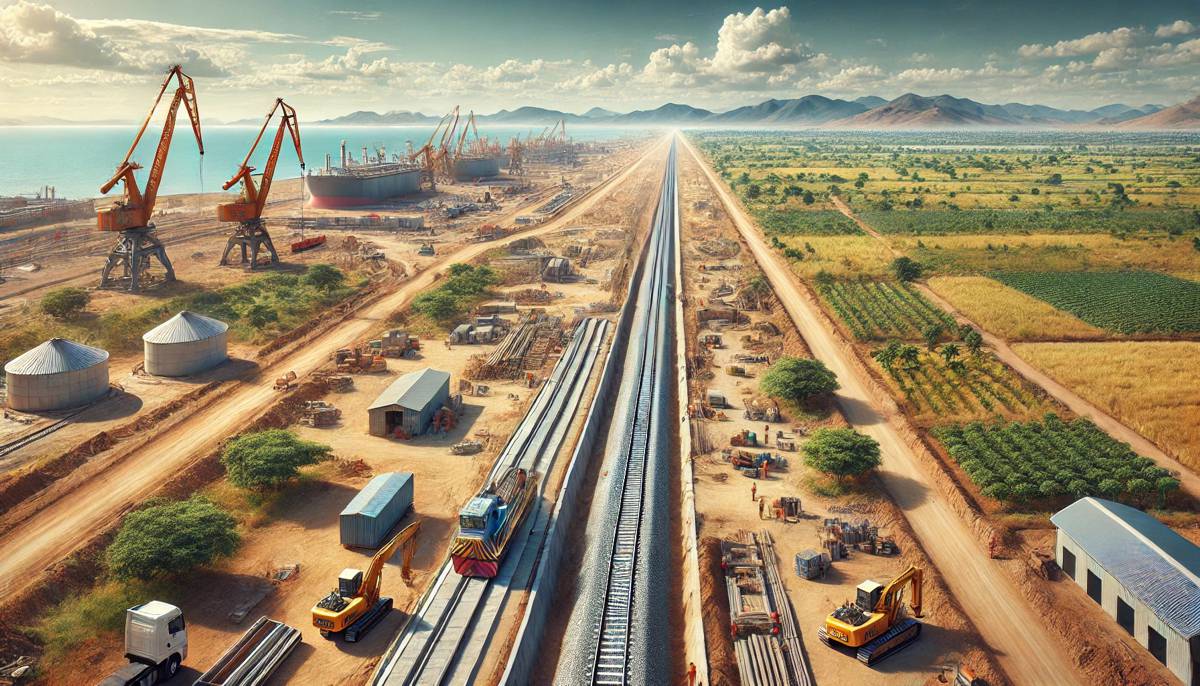Angola’s strategic Rail Project rolls forward
The African continent has long grappled with the challenge of building robust infrastructure to facilitate economic growth, and rail transport is at the heart of many nations’ ambitions.
In a bold move to revamp regional connectivity, the governments of Angola and Zambia have signed crucial concession agreements with the Africa Finance Corporation (AFC) to spearhead the development of a transformative rail project: the Lobito Corridor. This project promises to be a game-changer for trade, mining, and agriculture across multiple African nations, providing an efficient and sustainable alternative for moving goods to international markets.
Connecting Africa Like Never Before
At the heart of the Lobito Corridor lies a vision for interconnected trade across the African continent. The Lobito Rail project aims to construct a new 800-kilometre greenfield railway that will link the existing Benguela Railway in Luacano, Angola, with Zambia’s Chingola Rail Line. Once completed, this rail line will serve as a vital artery, transporting goods from the Democratic Republic of Congo (DRC) and Zambia, two of the world’s richest mining regions, straight to the Port of Lobito on Angola’s Atlantic coast.
The project’s significance cannot be understated. With key players such as the U.S. government, the European Union, and the African Development Bank providing support, the Lobito Corridor will unlock untapped trade potential between Africa’s interior and international markets. It also aligns with broader efforts to establish the African Continental Free Trade Area (AfCFTA), making it easier for nations to trade within the continent and beyond.
But the benefits extend far beyond logistics. According to AFC’s Chief Executive Officer, Samaila Zubairu: “This project represents a critical step in fostering regional integration and economic development, providing a quicker, safer, and more environmentally-friendly option for the transport of goods.” As Africa looks to the future, the Lobito Rail project stands at the forefront of these efforts.
Leading the Charge
The Africa Finance Corporation, a pan-African multilateral institution, was appointed lead developer of the project in 2023, charged with the monumental task of coordinating efforts among multiple stakeholders. Their responsibility isn’t limited to funding; AFC will oversee the design, construction, and operation of the railway. Notably, they’ve secured a $2 million grant from the United States Trade and Development Agency (USTDA) to fund crucial environmental and social studies.
These studies are essential in ensuring that the railway project is developed in a manner that respects local communities and the environment. The environmental impact, in particular, is a focal point as Africa strives to balance economic growth with sustainability. While the railway will make mineral transportation more efficient, it will also help reduce carbon emissions by providing a greener alternative to road transport, aligning with global efforts to cut emissions.
The rail line’s completion will open a direct corridor between the Atlantic and Indian Oceans, connecting the Port of Lobito with Tanzania’s Port of Dar es Salaam. This will streamline global trade routes, significantly cutting down transit times and costs for goods being shipped across continents.
Economic Opportunities from Minerals to Agriculture
For Zambia and the DRC, the benefits are clear. Both countries are rich in natural resources, particularly copper and cobalt—two minerals essential to the global green energy transition. The rail line will provide a much-needed solution for getting these raw materials to international markets faster and at lower costs. It will also diversify export routes, reducing the region’s dependence on the Port of Durban in South Africa, which has historically been the go-to for exportation.
Beyond the mining sector, agriculture stands to gain significantly from the Lobito Corridor. Zambia, in particular, is known for its agricultural output, and the rail project will facilitate the export of crops and agricultural products to new markets. Farmers and agricultural businesses in Zambia’s Copperbelt and Northwestern Provinces will have direct access to the Lobito Port, offering faster routes to Europe and the Americas.
A New Trade Frontier
The Lobito Corridor is poised to change Africa’s logistics landscape. By linking Zambia and the DRC to Angola’s coastline, it establishes a new, strategic trade corridor across the continent. This development will reduce bottlenecks at existing ports and provide exporters with an alternative to Southern Africa’s increasingly congested maritime routes.
Trade analysts are particularly excited about the Lobito Corridor’s potential to transform the region into a logistics powerhouse. “The significance of this rail project can’t be overstated,” says African Union trade expert Njabulo Nkosi. “For Zambia and the DRC, it offers the shortest route to international markets, and for Africa, it opens the door to enhanced intra-continental trade, something we’ve been striving for over decades.”
Indeed, the rail project is a perfect example of how Africa is finding solutions to its unique logistical challenges. While many international eyes are on Africa for its raw materials, the Lobito Corridor will help the continent leverage its resources for greater economic independence.
A Catalyst for Growth
This ambitious rail project is more than just a transport route; it’s a catalyst for broader infrastructure development across the region. As the Lobito Corridor comes to life, it will likely spur the construction of roads, bridges, and telecommunications infrastructure in previously underserved areas. The ripple effect of such development can be transformational for local economies.
Not only will it create jobs during the construction phase, but once operational, the railway will require a skilled workforce to manage and maintain the rail line. This is expected to lead to long-term job creation, particularly in Angola, Zambia, and the DRC. Moreover, by connecting isolated regions with major trade hubs, the project will improve access to services, education, and healthcare for communities along the corridor.
What’s Next for Africa’s Rail Revolution?
As construction moves forward, many are looking at the Lobito Corridor as a model for future infrastructure projects across Africa. It’s not just about building a railway; it’s about building a future. AFC’s successful coordination of international stakeholders, along with its ability to secure financing and navigate complex regulatory environments, will likely inspire similar projects across the continent.
The Lobito Rail Project is about much more than trade—it’s about connectivity, regional cooperation, and unlocking Africa’s potential in the global economy. It symbolises the continent’s forward-looking approach to development and its resolve to harness its resources for the benefit of its people.
A Bright Future for African Infrastructure
With the signing of these concession agreements, Angola and Zambia are firmly on the path to realising a vision of interconnected African trade. The Lobito Corridor stands as a beacon of progress, proving that when African nations collaborate with global partners, transformative projects can become a reality.
For Zambia, Angola, and the DRC, the future looks bright—brighter still with the rail project set to bring economic prosperity, regional integration, and sustainable growth to the heart of Africa.





















